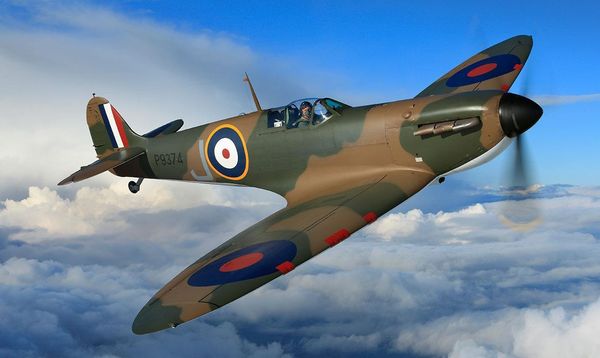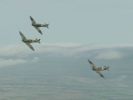Eye For Film >> Movies >> Spitfire (2018) Film Review
Spitfire
Reviewed by: Angus Wolfe Murray

Since this documentary coincides with the 100th birthday of the RAF you would be forgiven for thinking it must have been cobbled together from the video library at the Imperial War Museum.
Guess what? You're wrong.

It's better than that.
Directors David Fairhead and Ant Palmer have succeeded in turning something that could have been as boring as an Open University history lesson into a labour of love, although the word "labour" makes it sound heavy when "a dancing fairy" was the description given by one of the ninetysomething ex pilots.
"Never was so much owed by so many to so few" echos through the collective memory of those who weren't there like a catchphrase. This film, more than any other, illustrates the reality behind Churchhill's words. You can gather stats - Hitler had a 4-to-1 advantage in the air in 1940, etc - until the cows come home. Brushing up on useful facts for the pub quiz doesn't mean squiddly squif compared with what it must have been like to risk your life every day in an airplane as versatile and responsive at the Spitfire.
You learn about the designer, R J Mitchell, and where his ideas came from and why his creation was called "the most beautiful machine ever built". He died in 1937, aged 42, when the Spitfire was less than a year beyond its test flight and the war hadn't started yet.
Where the film improves on others of its ilk is the way the directors use aerial photography to resurrect and recreate the breathless beauty of flight, not any old flight, but the Spitfire experience, the dog fights and the danger of being overwhelmed and outnumbered in blazing skies above a green and still pleasant land. Also the talking heads have been perfectly chosen. Mainly they are ex pilots who speak clearly and with humour about what they remember. All are old (obviously) and every one tells a fascinating, often gripping, story.
The film succeeds in making you understand how these young men saved the country from enemy occupation and how desperately close it was. There were two critical moments when things could have gone the other way. If Hitler had invaded immediately after Dunkirk we couldn't have stopped him and then again when the pilots were exhausted and diminished after defending British airfields the Germans took a break before changing tack and starting the blitz on London, which gave the RAF an opportunity to repair machines and allow their pilots to rest.
The Spitfire and those who flew in them were responsible for Hitler's first defeat. Fairhead and Palmer's film lets the audience appreciate the courage and tenacity of this achievement without sentimentality or ostentation.
Pity about the ending - too long in the leaving and a little off course.
Reviewed on: 11 Jul 2018
















